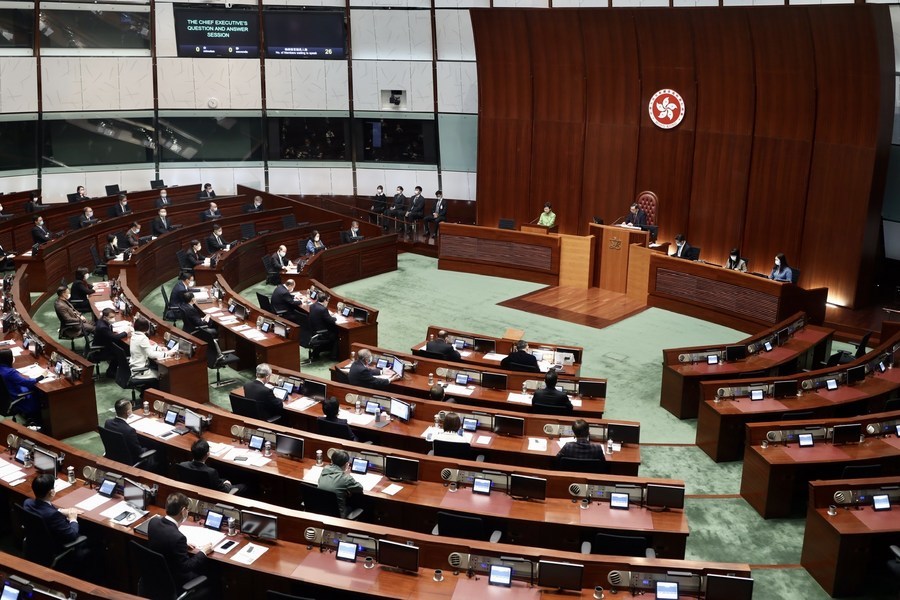
This photo shows a Legislative Council (LegCo) session in Hong Kong, China, Feb 4, 2021. (Photo: Xinhua)
Leading industry figures in Hong Kong said that the measures to rectify the city's political system will pave the way for the special administrative region's economic revival.
They expressed their hopes after the National People's Congress, China's top legislature, started to deliberate on a draft decision on improving Hong Kong's electoral system. The improvement will see changes to the formation, size and function of its legislature and Election Committee, which picks the city's leader, to ensure only patriots administer the city.
Henry Tan, a Hong Kong deputy to the NPC and chairman of the Textile Council of Hong Kong, said he expected the city would have a bright future led by patriotic political leaders once the system is improved.
Tan said the incessant riots in 2019 illustrated the pressing need for a political system run by patriots to ensure the city's political stability.
Kennedy Wong Ying-ho, vice-president of the Hong Kong Chinese Importers'& Exporters' Association, said that with an improved electoral system, the city will see rational debate return to its legislature and stability will return to society.
With stability, the city will then be able to move on and have space to discuss how to tackle issues related to its economy and people's livelihoods, Wong said.
Vice-Premier Han Zheng reiterated on Sunday that the central government attaches great importance to issues such as national security and the electoral system in the Hong Kong SAR, and has fully listened to the opinions of all parties in the city.
During a meeting with the Hong Kong SAR delegation on the sidelines of the fourth session of the 13th NPC, Han expressed unwavering support for Hong Kong's role as a world-renowned financial center, a status that must be reinforced rather than undermined.
Housing issue
The housing problem, the toughest livelihood issue facing the overcrowded city, needs to be solved, Han stressed.
He urged Hong Kong to make itself more relevant to the grand story unfolding on the Chinese mainland, with proactive integration into the Guangdong-Hong Kong-Macao Greater Bay Area.
Wendy Man Lai-hung, founder and vice-chairman of Clifford Group, who is also a deputy to the NPC, said improving the electoral system will once and for all prevent anti-China forces and troublemakers from holding the SAR back from integrating into the bay area and the nation's development.
Hong Kong's integration into national development is also mentioned in the draft Outline for the 14th Five-Year Plan (2021-25) for National Economic and Social Development and the Long-Range Objectives Through the Year 2035, which was submitted to the NPC on Friday.
In the designated chapter for the Hong Kong and Macao special administrative regions, the central government pledges to improve the mechanism for the regions to integrate into the nation's development plan. It also said it will support Hong Kong's role as an international financial, shipping, trade and aviation hub, as well as an offshore renminbi trade hub and an international capital and risk management center.
In a social media post on Friday evening, Hong Kong Chief Executive Carrie Lam Cheng Yuet-ngor said compared with the 13th Five-Year Plan (2016-20), it is inspiring to see that the draft outline of the 14th Five-Year Plan has made an additional mention of supporting Hong Kong in building an international innovation and technology center, enhancing its status as an international aviation hub and developing a center for cultural exchanges between China and the rest of the world.
Central govt support
Chan Ching-chuen, Hong Kong's first academician of the Beijing-based Chinese Academy of Engineering, said the national support for Hong Kong's new roles in areas including innovation and cultural exchanges will boost the city's economic transformation.
Chan said it will help the city to achieve its long overdue goal of diversifying its economic structure to be part and parcel of the nation's development in innovation and technology.
In a broader sense, Hong Kong's tech vision adds more substance to plans to harness the bay area's finest minds and technological strengths in the building of a global innovative powerhouse.
"The most crucial part of Hong Kong's better integration into the bay area lies in deeper collaboration between the city and Shenzhen," said Jonathan Choi Koon-shum, chairman of the Chinese General Chamber of Commerce Hong Kong.


